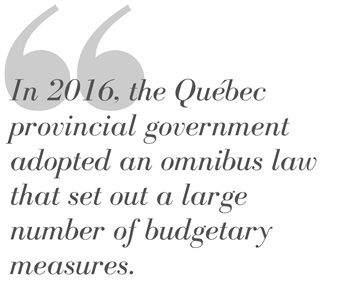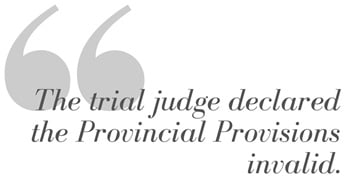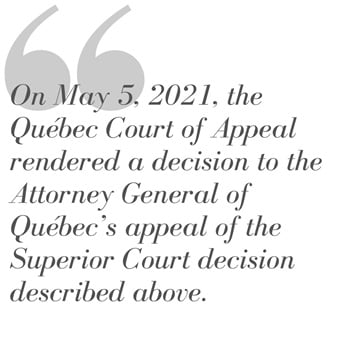Gaming & Hospitality Legal News, Volume 12, Number 18: Attorney General of Quebec v. Canadian Wireless Telecommunications Association
DOWNLOAD PDF- Lipton, K.C., Michael D. Weber, Kevin J.
- Industry Alerts
Click “Subscribe Now” to get attorney insights on the latest developments in a range of services and industries.
Overview
The Canadian Criminal Code (the “Code”) [1] sets out the parameters of legal gaming in Canada pursuant to section 91 (27) of the Constitution Act, 1867,[2] which gives the federal government jurisdiction over criminal penalties and sanctions such as those applicable to gambling. The Code prohibits gambling except where permitted by explicit statutory exemptions, one of which provides that online gambling is lawful where it is conducted and managed by a provincial government. In Québec, the Société des loteries du Québec (“Loto-Québec”) conducts and manages lotteries and online gambling activities as an arm of the provincial government.[3].
 In 2016, the Québec provincial government adopted an omnibus law that set out a large number of budgetary measures.[4] Included in this omnibus legislation were provisions that purported to amend sections 260.33 to 260.37 of the Consumer Protection Act (the “CPA”) to require that internet service providers (“ISP”s) take steps to block persons in Québec from accessing online gambling sites other than those conducted and managed by Loto-Québec (the “Provincial Provisions”).[5] The Canadian Wireless Telecommunications Association (known in French as the Association canadienne des télécommunications sans fil) (the “Association”), a non-profit association representing the wireless telecommunications industry, commenced an application in the Montreal Superior Court, challenging the validity, applicability, and operability of the Provincial Provisions. The Association invoked the unconstitutionality of the Provincial Provisions because the provincial law sought to regulate matters of telecommunications and criminal law, both of which are under exclusive federal jurisdiction. Under Canadian constitutional law, where the “pith and substance” of provincial legislation falls within an area of federal legislative competence under the Constitution Act, 1867, the law is unconstitutional and accordingly of no force and effect. In response, the Attorney General of Québec justified the Provincial Provisions on the ground that illegal online gambling sites represent a risk for the population, especially for young people, involving abuse to consumers and public health (both matters within the provincial sphere of regulation under the Constitution Act, 1867. Accordingly, the provincial government argued that the protection of these vulnerable consumers fell within its jurisdiction, and therefore, the Provincial Provisions should stand.
In 2016, the Québec provincial government adopted an omnibus law that set out a large number of budgetary measures.[4] Included in this omnibus legislation were provisions that purported to amend sections 260.33 to 260.37 of the Consumer Protection Act (the “CPA”) to require that internet service providers (“ISP”s) take steps to block persons in Québec from accessing online gambling sites other than those conducted and managed by Loto-Québec (the “Provincial Provisions”).[5] The Canadian Wireless Telecommunications Association (known in French as the Association canadienne des télécommunications sans fil) (the “Association”), a non-profit association representing the wireless telecommunications industry, commenced an application in the Montreal Superior Court, challenging the validity, applicability, and operability of the Provincial Provisions. The Association invoked the unconstitutionality of the Provincial Provisions because the provincial law sought to regulate matters of telecommunications and criminal law, both of which are under exclusive federal jurisdiction. Under Canadian constitutional law, where the “pith and substance” of provincial legislation falls within an area of federal legislative competence under the Constitution Act, 1867, the law is unconstitutional and accordingly of no force and effect. In response, the Attorney General of Québec justified the Provincial Provisions on the ground that illegal online gambling sites represent a risk for the population, especially for young people, involving abuse to consumers and public health (both matters within the provincial sphere of regulation under the Constitution Act, 1867. Accordingly, the provincial government argued that the protection of these vulnerable consumers fell within its jurisdiction, and therefore, the Provincial Provisions should stand.
Superior Court Decision
The trial judge declared the Provincial Provisions invalid. In arriving at this decision, the trial judge found that the pith and substance of the Provincial Provisions were to allow Loto-Québec to force ISPs to block access by individuals in Québec to online gambling sites it deems illegal, not to protect consumers. According to the trial judge, that pith and substance could not be validly linked to any legislative powers of the province in matters of consumer protection, health, gambling, or any other matter of local or private nature. Rather, such actions fell within areas of exclusive federal jurisdiction, namely telecommunications and criminal law. In addition, the trial judge noted that recognizing a federal-provincial “dual aspect” in the operation of a telecommunications network or in the penalties applicable to online sites not operated by the province would require that both the federal government and the provinces be able to legislate in this regard. However, the trial judge stated that recognizing a dual aspect in those matters would run counter to the precedents confirming federal jurisdiction with respect to telecommunications systems and criminal law, including Johnson v. AG of Alberta[6] and Toronto (Corp. of the City of) v. Bell Telephone Co. of Canada (1904)[7]. Consequently, the double aspect theory could not apply. Finally, the trial judge held that the theory of ancillary powers does not make it possible to safeguard the constitutional validity of the Provincial Provisions given the breadth of its encroachment onto federal powers. Therefore, the contested provisions could not be saved, and the Superior Court granted the Association’s application for a declaration of invalidity.
Quebec Court of Appeal
On May 5, 2021, the Québec Court of Appeal rendered a decision to the Attorney General of Québec’s appeal of the Superior Court decision described above. After re-examining the intrinsic evidence, the extrinsic evidence, and the legal and practical effects of the Provincial Provisions, the Court of Appeal concluded that the Superior Court did not err in determining the true pith and substance of the provisions. Justice Gagnon, writing on behalf of the Court of Appeal, found that the Superior Court was correct in finding that in adopting the Provincial Provisions, the Québec legislature intervened in the exclusive federal jurisdiction over telecommunications. Justice Gagnon summarized and followed the line of precedents which confirmed that telecommunications, and by extension the regulation of the transmission and reception of signals transmitted by ISP networks and installations, is a federal matter.
This result means that despite the Provincial Provisions having been declared in force in 2016, the provisions purporting to regulate ISPs serving customers in Québec have never been operative and will remain inoperative, barring a successful application for leave to appeal to the Supreme Court of Canada on the part of the Attorney General.
Contact Michael Lipton at mdliptonqc@dickinsonwright.com or 416-866-2929 for further information with respect to the above-noted.
[1] RSC 1985, c. C-46.
[2] 30 & 31 Vict, c 3.
[3] RSC 1985, c. C-46.
[4] S.Q. 2016, c. 7.
[5] CQLR, c. P-40.1.
[6] [1954] SCR 127.
[7] [1905] AC 52, [1905] 1 Olmsted 505.
Related Practices
Contacts
Recent Insights
- Industry Alerts Litigating in Ontario
- Blogs Tax Planning Misstep? Ontario Court of Appeal Says No to Rectification
- February 12, 2026 In the News Two Dickinson Wright Lawyers Recognized in Chambers Global Guide 2026
- December 4, 2025 In the News Two Dickinson Wright Attorneys Recognized in Lexology Index Thought Leaders Global Elite 2026
- November 21, 2025 In the News Four Dickinson Wright Lawyers Recognized in Lexology Index Canada 2025
- June 5, 2025 In the News Dickinson Wright Receives Top Rankings in 2025 Chambers USA Guide; 64 Attorneys Recognized as Leaders in their Fields
- March 11, 2025 In the News Three Dickinson Wright Lawyers Recognized in Chambers Global Guide 2025
- February 24, 2025 Video Minutes on the Matter with Mike Beckwith: Federal Anti-Money Laundering Trends
- January 03, 2025 In the News Law360 recently published Michael Beckwith’s article, “5 Notable Anti-Money Laundering Actions From 2024,”


